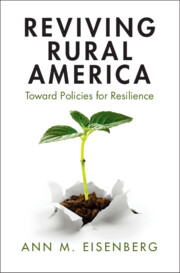Book contents
- Reviving Rural America
- Reviving Rural America
- Copyright page
- Contents
- Figures
- Acknowledgments
- 1 Introduction
- 2 The Foundational Myths
- 3 The Myth of Rural Empowerment
- 4 The Myth of Rural Unsustainability
- 5 The Myth of Rural Decline
- 6 The Myth of Rural Radicalism
- 7 The Myth of Rural Whiteness
- 8 The Myth of Rural Obsolescence
- Index
8 - The Myth of Rural Obsolescence
Published online by Cambridge University Press: 20 June 2024
- Reviving Rural America
- Reviving Rural America
- Copyright page
- Contents
- Figures
- Acknowledgments
- 1 Introduction
- 2 The Foundational Myths
- 3 The Myth of Rural Empowerment
- 4 The Myth of Rural Unsustainability
- 5 The Myth of Rural Decline
- 6 The Myth of Rural Radicalism
- 7 The Myth of Rural Whiteness
- 8 The Myth of Rural Obsolescence
- Index
Summary
This chapter addresses the myth that rural America is a relic of history and that rural contributions to society are no longer as critical as they once were. This chapter argues that rural America is the current and future site of essential national amenities and services. These underappreciated rural amenities include agricultural land and clean energy production, as well as rural regions’ status as the national safety net for a society that will need to migrate inland from the coasts where much of the population is concentrated today. The chapter makes the case that agricultural land, clean energy production, and rural infrastructure should be treated as commons resources, stewarded for our society’s collective benefit. Reconceptualizing rural America as a commons helps provide broad normative guidance for the challenging governance task of reconciling local entitlement to rural resources alongside regional and national entitlement to them. The chapter proposes five principles that would help better govern rural America as a more resilient commons, including recognizing more rural work as work in the public interest, building capacity to avoid boom–bust cycles, democratizing rural resources, pursuing racial justice as central to resilience, and recognizing that investing in rural infrastructure benefits society as a whole.
Keywords
- Type
- Chapter
- Information
- Reviving Rural AmericaToward Policies for Resilience, pp. 173 - 202Publisher: Cambridge University PressPrint publication year: 2024

